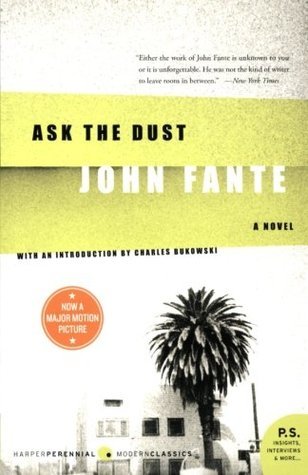TL;DR
Ask the Dust is a poignant exploration of love, ambition, and despair, following the tumultuous relationship between struggling writer Arturo Bandini and waitress Camilla Lopez in 1930s Los Angeles.
What is Ask the Dust about
Set against the backdrop of Depression-era Los Angeles, 'Ask the Dust' tells the semi-autobiographical story of Arturo Bandini, an aspiring writer with Italian-American roots. Living in a run-down hotel, Bandini grapples with poverty, his ambitions, and a tumultuous love affair with Camilla Lopez, a Mexican waitress. Their relationship is marked by passion and conflict, revealing the complex interplay of desire and desperation. Fante's narrative is characterized by its raw honesty and vivid imagery, capturing the essence of a struggling artist's life and the challenges of forging connections in a harsh environment. The novel, regarded as a classic of American literature, highlights Fante's influence on contemporary writers, particularly through the lens of Bukowski’s admiration for his work.
Ask the Dust 6 Key Takeaways
Arturo Bandini's Arrival in Los Angeles
The novel opens with Arturo Bandini arriving in Los Angeles from Colorado, full of dreams and ambitions to become a successful writer. However, the reality of life in the city is harsh, forcing him to confront his insecurities and societal challenges.
The Meeting with Camilla Lopez
Arturo's life takes a turn when he encounters Camilla Lopez, a spirited Mexican waitress. Their initial interactions are filled with tension, marked by Arturo's cold demeanor and Camilla's defiant spirit, setting the stage for a turbulent romance.
The Onset of Their Love-Hate Relationship
Their relationship evolves into a complex love-hate dynamic, characterized by passion intertwined with emotional turmoil. They both grapple with their ambitions and personal struggles, leading to moments of intense connection and deep conflict.
Arturo's Literary Aspirations
As Arturo strives to write his great novel, his experiences with Camilla deeply influence his work. The interplay between his reality and literary ambitions showcases the struggles of an artist seeking validation in a world filled with rejection.
The Descent into Madness
The narrative gradually shifts towards a darker tone, as Arturo and Camilla’s unresolved issues lead them into a spiral of madness. Their inability to communicate authentically exacerbates the emotional distance, culminating in a tragic climax.
Resolution and Reflection
In the end, Arturo is left to reflect on the nature of love, ambition, and self-destruction. The novel closes with a poignant sense of loss and the realization that the pursuit of greatness often comes at a high personal cost.
Top Ask the Dust Quotes
- Fante’s writing reminds us that the struggle for love and success is both beautiful and painful.
- In the depths of despair, we often find our truest selves, a notion beautifully captured within the pages of 'Ask the Dust.'
- Arturo's journey reveals the profound connection between suffering and the artistry it inspires.
Who should read Ask the Dust?
This book is ideal for readers interested in classic American literature, particularly those who appreciate raw and honest depictions of love and ambition. Writers and aspiring authors will find inspiration in Fante's exploration of the artistic struggle, while fans of character-driven narratives will be drawn to the complex dynamics between Arturo and Camilla.
Ask the Dust Best Reviews
- Charles Bukowski, in his introduction, calls Fante 'my god,' indicating the profound impact Fante's work has had on subsequent generations of writers. His raw and honest prose captures the struggles of the human experience like few others.
- The New York Times praises 'Ask the Dust' as a visceral and unfiltered narrative that delves into the complexities of love and ambition, positioning it as a timeless piece of American literature.
- 'Ask the Dust' is described as a 'tough and unsentimental story with a soft and tender heart,' illustrating Fante's unique ability to blend grit with sensitivity in his storytelling.
People also liked these summaries
Ask the Dust FAQs
Is Ask the Dust a true story?
'Ask the Dust' is a semi-autobiographical narrative, reflecting John Fante's own experiences as a struggling writer in Los Angeles during the Great Depression, exploring themes of poverty and artistic ambition.
Why is Ask the Dust considered a classic?
'Ask the Dust' is celebrated for its raw portrayal of the human experience, its complex characters, and Fante's poetic prose, making it a timeless exploration of love and aspiration.
